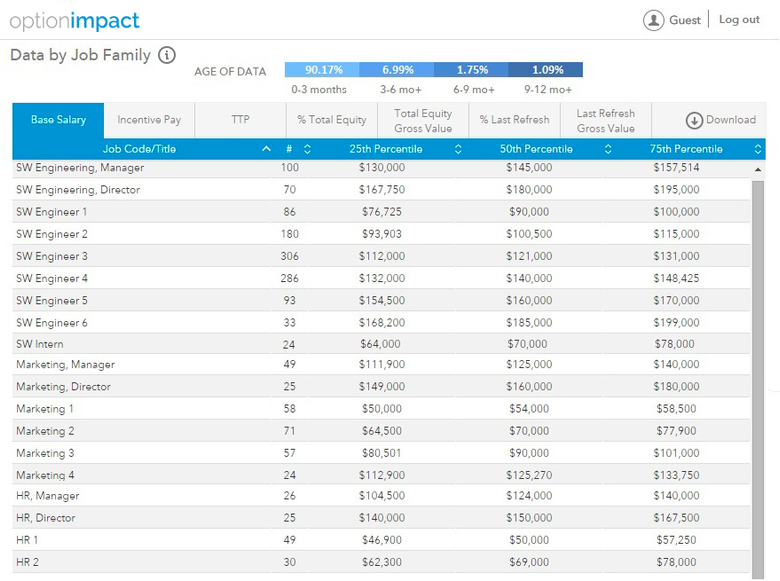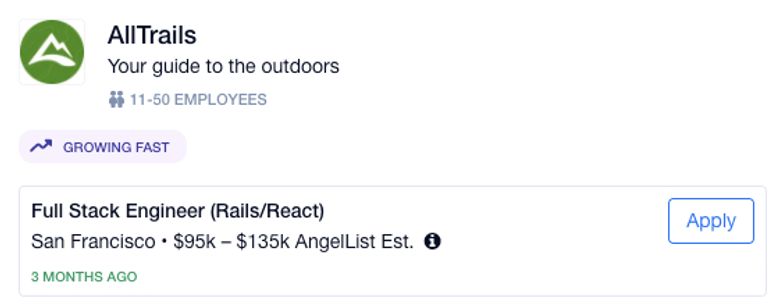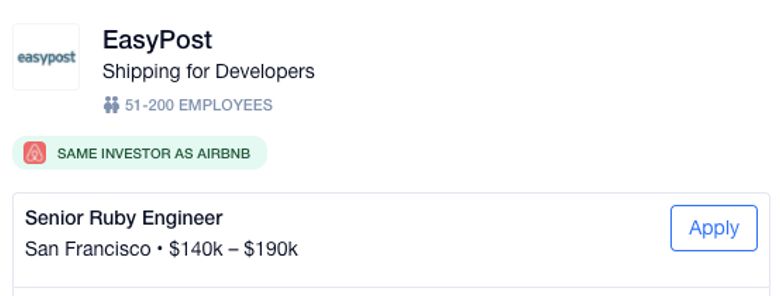The Secret Salary Database for Startups You've Never Heard Of
Ever wondered how startups determine your pay? Thousands use an exclusive salary database called Option Impact.
Negotiating a salary proportionate to your market value affects not only your job satisfaction but your capacity for building wealth—and may even determine the age at which you retire.
Most rank-and-file workers turn to sites like Indeed, Glassdoor, and Payscale to browse crowdsourced salaries from other professionals with similar job titles and years of experience, but research shows that these platforms can be woefully inaccurate.
Since salaries are self-reported and not verified—and are also derived by AI algorithms that comb through millions of data points—there’s major room for error. Indeed.com obtains salary data from job postings, which often feature a salary band rather than an exact number, and are subject to negotiation. Even sites like Stack Overflow, which are geared towards IT jobs, feature self-reported salaries.
Secondly, startup compensation is a little different than compensation structures at large public companies. How much equity vs. cash should you negotiate in a remuneration package? What kind of vesting schedule can you realistically expect from a seed-stage startup?
Well, there’s a database for that. The catch? It’s not available to most people—unless you’re a venture capitalist at a tech startup.
What is Option Impact?

Option Impact is an exclusive salary database for tech startups. Companies must share the anonymized salaries of every employee—from intern to C-suite—in exchange for free access. The figures are reported by employers themselves and vetted by the Option Impact team, guaranteeing higher accuracy than self-reported salaries.
According to the company’s website, over 3,000 VC-backed privately owned startups use it, and the majority of top VC firms have access. The vault is searchable by job title, location, company size, revenue, and funding stage, so users can come up with a realistic salary band based on their company’s status. Users can also see granular compensation details like ownership distribution, equity burn, vesting schedules, and merit budgets.
Unfortunately, the accuracy of the data is partly attributed to its exclusivity. In fact, according to Advanced-HR, the company that runs Option Impact, people want access to this data so badly that someone showed up at the company’s San Francisco office in 2016 to offer chocolate in exchange for access to mid-level engineering data. Naturally, the company declined the generous gift.
Let's look at some examples

Photo from Advanced-HR (now part of Shareworks)
Often, applicants will underestimate how much they’re worth, according to Option Impact. For example, a software engineer with 4-6 years of experience at a midsize SF startup earns $120,000 on average. According to Option Impact, the salary is closer to $141,000.
Another example—according to Glassdoor, a project manager with 4-6 years of experience makes $82,403, but according to Option Impact, these professionals command $137,000, which is 66% more.
Here are some other salary estimates that show the chasm between Glassdoor salary estimates and Option Impact, according to Ask The Headhunter.
QA engineer with 1-3 years experience
Option Impact: $101,955 (+45%)
Glassdoor: $71,044
Data scientist with 4-6 years experience
Option Impact: $132,536 (+3%)
Glassdoor: $129,118
In a piece for Wired, freelance journalist Rachel Nuwer interviewed a software engineer named “Steve” (name changed for anonymity) who got access to Option Impact using a previous employer’s login. While interviewing for a job, he was offered $180,000 that he would have gladly accepted, had he not seen from Option Impact that the reported salary for his job was a lot higher. His eventual starting salary? $205,000 (+23%).
What other options do I have besides Option Impact?

While the value proposition of Option Impact for startup employees is undeniable, rank-and-file workers won’t be gaining access to the database anytime soon, unfortunately. So what should you do if you have an interview lined up at a startup and you want to know your true worth?
Compensation at private companies is all about equity—typically stock options—and the potential to make more money on that equity than you would working somewhere else. On the flipside, however, is the possibility that your equity becomes worthless.
Bureau of Labor Statistics
One of the best options for obtaining reliable salary data is the US Bureau of Labor Statistics, which uses a combination of 12 different employer surveys on pay and benefits to segment data according to occupation, industry, geographic area, and the demographic characteristics of workers.
One downside of using the BLS database as a yardstick for your own market worth is that the job titles seem a little outdated, and similar titles tend to be lumped under one category. For example:
- Data science salaries are grouped together with all “mathematical science occupations” which include things like systems engineer, statistician, and even research mathematician.
- Similarly, a search for UX design salaries yields a database that combines “web developers and digital designers” which is also a broad category.
Salary.com
Another option is CompAnalyst by Salary.com, which aggregates data from employer surveys. Questionnaires are filled out by HR staff, and include details about base salary, bonuses, and incentive pay.
Job seekers can also pay $29-$79 (depending on the salary level for the job in question) for a personalized report that takes into account factors like years of experience and education level.
AngelList
When it comes to startup compensation, AngelList is one of the best repositories for salary data. According to AngelList, salary estimates are “generated using salary data from thousands of U.S. employers and third-party sources.” Estimates are tagged with the words ‘AngelList Est’ and represent a range based on similar roles.

However, AngelList also lists company-provided company-provided salary ranges on job postings from companies that elect to share salary data.

Triplebyte
A job search platform for engineers, Triplebyte aggregates figures from actual offers made to software engineers on the platform in real-time to generate salary estimates. The average software engineer base salary (all levels) on Triplebyte is $151,000, compared to Glassdoor’s estimate of $108,249.
Bear in mind that Triplebyte only shows base salary not including equity, bonuses, signing bonuses, relocation packages, or additional cash compensation. However, candidates can calculate the potential value of an equity offer using the startup equity value calculator.
The information provided herein is for general informational purposes only and is not intended to provide tax, legal, or investment advice and should not be construed as an offer to sell, a solicitation of an offer to buy, or a recommendation of any security by Candor, its employees and affiliates, or any third-party. Any expressions of opinion or assumptions are for illustrative purposes only and are subject to change without notice. Past performance is not a guarantee of future results and the opinions presented herein should not be viewed as an indicator of future performance. Investing in securities involves risk. Loss of principal is possible.
Third-party data has been obtained from sources we believe to be reliable; however, its accuracy, completeness, or reliability cannot be guaranteed. Candor does not receive compensation to promote or discuss any particular Company; however, Candor, its employees and affiliates, and/or its clients may hold positions in securities of the Companies discussed.
